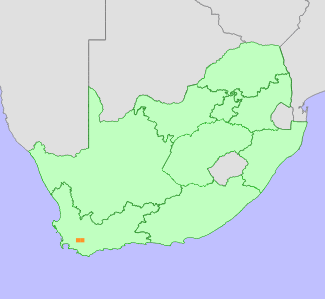|
Scientific Name | Serruria viridifolia Rourke |
Higher Classification | Dicotyledons |
Family | PROTEACEAE |
Common Names | Mat Spiderhead (e) |
National Status |
Status and Criteria | Vulnerable D2 |
Assessment Date | 2020/07/02 |
Assessor(s) | A.G. Rebelo, H. Mtshali & L. von Staden |
Justification | Serruria viridifolia is a restricted endemic to the mountains of the Cape Floral Region. It has an extent of occurrence (EOO) of 147 km² and area of occupancy (AOO) of 48 km². It is known from two locations, and is potentially threatened by too frequent fires and competition from alien invasive plants, which are already present in low densities at both locations. It therefore qualifies for listing as Vulnerable under criterion D. |
Distribution |
Endemism | South African endemic |
Provincial distribution | Western Cape |
Range | This species is endemic to the mountains of the Western Cape Province, South Africa, where it occurs at Stettynsberg and along the western Riviersonderend Mountains. |
Habitat and Ecology |
Major system | Terrestrial |
Major habitats | North Sonderend Sandstone Fynbos, Hawequas Sandstone Fynbos |
Description | It grows in deep sands on high altitude sandstone plateaus. Mature individuals are killed by fires, and only seeds survive. Seeds are released after ripening, and are dispersed by ants to their underground nests, where they are protected from predation and fire. It is pollinated by insects. |
Threats |
| Serruria viridifolia is known from two geographically isolated areas. All of its habitat is formally protected. Alien invasive plants have been observed in low densities at these areas. If these are not controlled, they are likely to increase in density and eventually outcompete native species. It is also potentially vulnerable to too frequent fires. |
Population |
This species is known from seven subpopulations. Plants are scattered beneath other plants. The population is not currently declining, but could decline in future if low densities of alien invasive plants currently present in its habitat are not controlled.
|
Population trend | Stable |
Assessment History |
Taxon assessed |
Status and Criteria |
Citation/Red List version | | Serruria viridifolia Rourke | VU D2 | Raimondo et al. (2009) | | Serruria viridifolia Rourke | Rare | Hilton-Taylor (1996) | |
Bibliography |
Goldblatt, P. and Manning, J.C. 2000. Cape Plants: A conspectus of the Cape Flora of South Africa. Strelitzia 9. National Botanical Institute, Cape Town.
Hilton-Taylor, C. 1996. Red data list of southern African plants. Strelitzia 4. South African National Botanical Institute, Pretoria.
Manning, J.C. and Goldblatt, P. 2012. Plants of the Greater Cape Floristic Region 1: The Core Cape Flora. Strelitzia 29. South African National Biodiversity Institute, Pretoria.
Raimondo, D., von Staden, L., Foden, W., Victor, J.E., Helme, N.A., Turner, R.C., Kamundi, D.A. and Manyama, P.A. 2009. Red List of South African Plants. Strelitzia 25. South African National Biodiversity Institute, Pretoria.
Rebelo, T. 2001. Sasol Proteas: A field guide to the proteas of southern Africa. (2nd ed.). Fernwood Press, Vlaeberg, Cape Town.
|
Citation |
| Rebelo, A.G., Mtshali, H. & von Staden, L. 2020. Serruria viridifolia Rourke. National Assessment: Red List of South African Plants version . Accessed on 2025/04/14 |
 Comment on this assessment
Comment on this assessment

